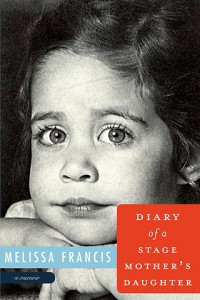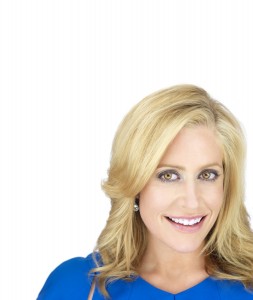 Today's guest: Melissa Francis
Her book: Diary of a Stage Mother's Daughter
Today's guest: Melissa Francis
Her book: Diary of a Stage Mother's Daughter
The scoop on it: The Glass Castle meets The Battle Hymn of the Tiger Mother in this dazzlingly honest and provocative family memoir by former child actress and current Fox Business Network anchor Melissa Francis.
Our thoughts: Completely. Riveted.
Giveaway: 5 copies! Just leave a comment and be entered to win. We'll select the winners on Sunday, February 24th after 12pm PST.
Where you can read more about Melissa: Her website, and follow her on Facebook and Twitter.
CHICK LIT IS NOT DEAD PRESENTS...AN INTERVIEW WITH MELISSA FRANCIS
 1. Liz & Lisa: Why did you decide to write this memoir?
1. Liz & Lisa: Why did you decide to write this memoir?
Melissa Francis: I started writing Diary of A Stage Mother's Daughter when the book Battle Hymn of the Tiger Mother reached critical mass. The idea of parents emulating that model really terrified me. It actually brought me to tears. It was hard for me to get the book and read through it in its entirety because I am the product of an extreme version of a tiger mom. In writing my memoir, I wanted to warn parents that that unrelenting form of parenting may make some children disciplined, focused achievers. As the author herself says, if you ride children hard early, you don't have to come down on them later. But with some kids, as you learn with my story, it can be wildly destructive and truly rob them of them of their confidence, sending them into a spiral of despair. There is no formula about how to be a parent, and when you see this exemplified as in Battle Hymn of the Tiger Mother, it doesn't necessarily work. Because all kids are unique individuals, it can be extremely dangerous.
2. L&L: What do you want people to learn from your book?
MF: I'd love for anyone who reads the book to feel that they can learn from a challenged past and whatever has happened to them, and then choose to have a joyous future. I hope that readers realize that a troubled past or a difficult childhood are experiences to draw and grow from later. You know what not to do when you grow up, or you know how you want to live differently. As long as you grab hold of it and take the right lessons out of it, you can decide how to control your own life and your own destiny. You can choose to be happy -- you can choose to have a new life. It is never too late, no matter how old you are. This is the point I make make in the very last scene of the book, where I see a woman I work with crumple into tears -- this incredible, gorgeous, successful woman with a family of her own -- and her mother just reduced her to tears. I said to her, as delicately as I could, "You can be free of that. You're an adult, and it's your choice now." You can choose to be happy and to be joyful and to have a different life. It's not easy, but it's better than the alternative, and within our control.
3. L&L: Do you have a favorite line or passage from your book?
MF: "The texture and color of my love for all three of them has proven to me that I can love, even though I was not ultimately loved myself. It doesn't matter what's come before if I can let go and try to do better. That truth was awakening. My own family is a new beginning."This passage comes at the very end of the book. I cried when I wrote it, and I still cry every time I read the words. I was afraid to have children for so long, because I wasn't sure I could be a better mother. My husband gave me the courage to hope. My family is my joy. And when people ask me why I would show my warts to the world (and they ask all the time), I say that I've broken the cycle and found real happiness, I sincerely want to help anyone else do the same. It is worth it.
4. L&L: As a mom, what have you learned from this experience that helps you be a better parent? (Tell us more about avoiding the "one size fits all, pressure-packed approach that you write about.)
MF: It took me a long time to process and figure out how to parent differently, but the number one lesson was, just because you were parented in a way that didn't work out doesn't mean you have to repeat the same behavior. You also don't have to be afraid to be a parent yourself, which I certainly was for a very long time. I would never tell someone how to parent, but I would suggest that every child is born unique and needs a different approach. Tiger Mothering is extremely dangerous as my story demonstrates. I have two young sons, two and five years old, who respond completely differently to the same type of praise or discipline. They are just hardwired differently. As I have watched them from day one, before I even had a chance to have any impact on them, they were different kids. You can't change that. I think my mom wanted to make both my sister and me into performers and achievers, and my sister wasn't built for that. She had her own fantastic qualities, and, if someone had taken the time to get to know her, could have fleshed out what she would be special and successful at. You have to help children bring out what's best about them and help them manage what's difficult about their own personalities and the way that they were born. Every child has a different path to happiness, and as parents it is our job to help them find their own way.
L&L: What memoir(s) are you reading now?
MF: Not surprisingly, my favorite memoir of all time is the Glass Castle by Jeannette Walls. I've read it so many times for courage and inspiration. We have so much in common: reporting on others as a way to shift the focus from our own lives, a past that is painful but has so much value. Hota Kotb has been a wonderful supporter and I just bought her new book, Ten Years Later. I'm heading on vacation next week and can't wait to start that.
Thanks, Melissa!
